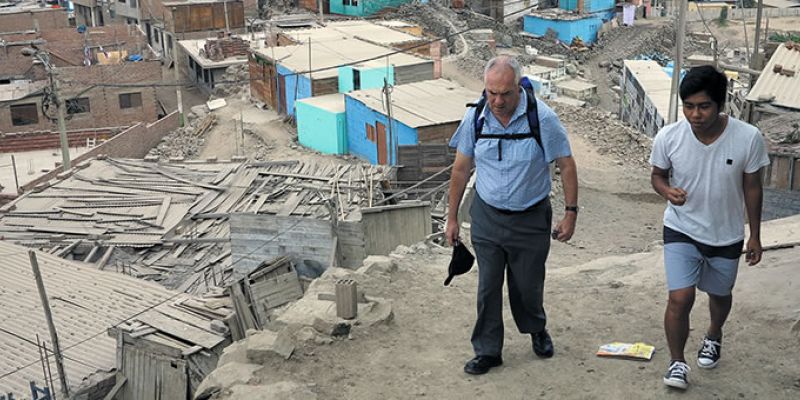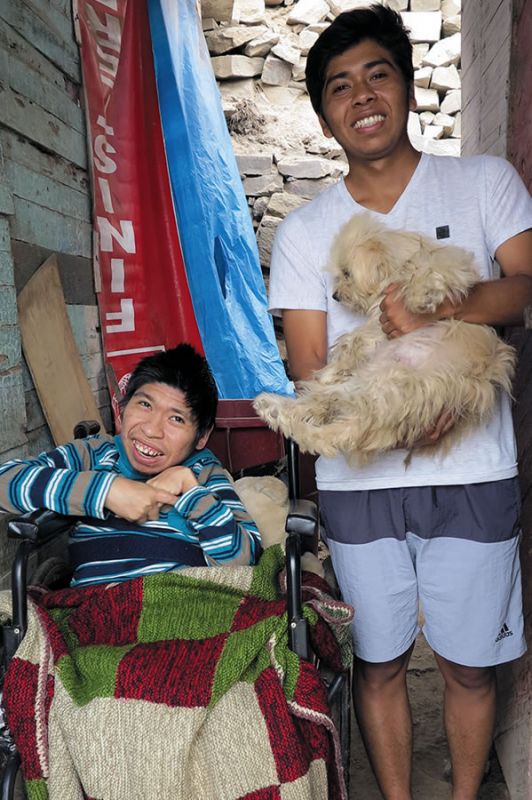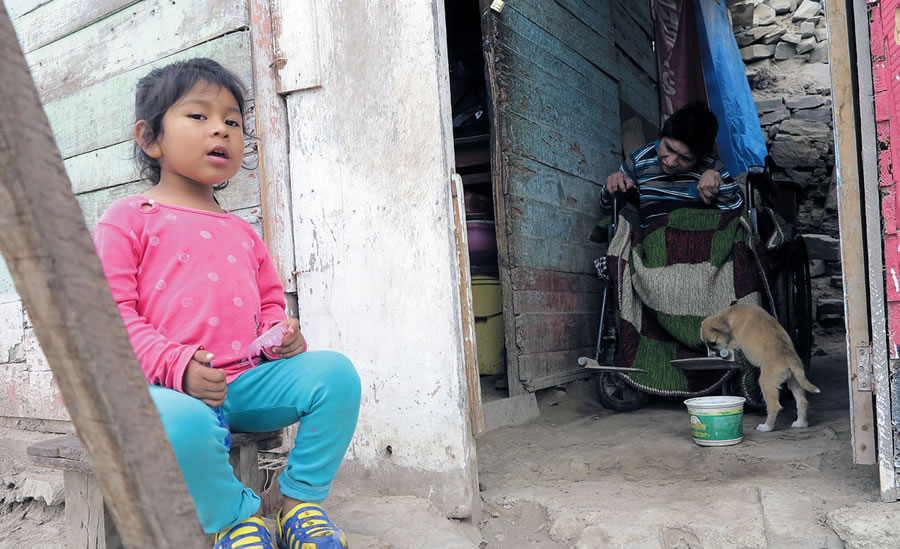
Devotion to Others
Sometimes you come across a bond of love that makes you feel really humble. This is what happened to me when I met Josè and David.
Josè and David Ayala are brothers. I met Josè first, when in 2014 I arrived at the Columban parish of "Saints Columban and Francis Xavier" on the outskirts of Lima, the capital of Peru. Josè was a young and cheerful catechist, working with young children. So good was he that soon I asked him to run the First Communion program in one of our chapels. It was much later that I met David. David doesn't come to church, for a good reason.

David is paraplegic. Since birth he has been almost entirely paralyzed from the neck down. He can hear and make sounds, but he can't speak. Although in his mid-twenties, he has a mental age of about four. David has a wheelchair. In fact, he has been confined to one for most of his life. At first I wondered why Josè and his parents never wheeled David to church, especially when we had our annual Mass for the sick. "Come and see why," Josè told me one day, and invited me to his home.
It soon became clear why David was never brought to church. The family is desperately poor, but, more to the point, their flimsy two-room wooden house clings precariously to the side of a hill. Around Lima, the Andes Mountains sweep right down to the sea, and the poorest inhabitants are often forced to live on the barren upland slopes where land is less expensive.
The hill where the Ayala family lives is rather special. It has been continuously settled since prehistoric times and is pitted with archaeological sites. Part of it is occupied by a huge and ancient cemetery, famous in Lima as the place where the poor were buried. Nowadays the local authority has constructed great funerary walls, and bodies are inserted into niches built into these walls. This is the cheapest way to bury people in Peru. However, not so long ago, bodies were invariably buried clandestinely in shallow graves, and it is not unusual to find your feet crunching through old bones if you stray from the designated paths.
The track up to the Ayala household is steep and rocky, totally unsuitable for wheeled traffic. On arrival, Josè presented me to David, his elder brother by three years. A relative was sitting with David. "He can't be left alone," explained Josè. "He is strong and can rock his wheelchair until it tips over."
I asked after the other members of the family, father Apolonio, mother Yolanda and younger brother Tony. "Tony is out most of the day studying," Josè told me. "Mamà and Papà work. They leave very early and come back at night." They are market gardeners, specializing in flower growing. Due to Lima's meteoric growth in recent years, they have to travel ever further to suitable fields. "Normally they leave at 5:00 a.m. but it can be earlier," remarked Josè. This is six – sometimes seven – days a week.

So the main burden of looking after David falls on Jose's shoulders. He looks after him during the day, caring for him, feeding him. You'd think a young man like Josè would resent being tied down like this, but not a bit of it. "It really isn't a problem for me, having a brother like David. I've looked after him for as long as I can remember. You just need a lot of patience. He's like a child. Sometimes he plays with me," continues Josè. "I'll be feeding him when he suddenly closes his mouth and looks away. Then, when I'm moving off, he'll turn his head back and open his mouth again. Then he'll shake with laughter. It'll be his little joke."
This really moved me. Even more surprising was Josè's view of the effect David has had on them all. "We've a great affection for David. He's kept us united as a family. Maybe he's been God's way of keeping us together."
Josè receives some help from his Aunt Rosa, who lives nearby. If Josè has to go out, she'll sometimes come round to mind David for him. She brings her three-year-old granddaughter Aìko, who has become great friends with David. Aìko will dance round him, and he'll reward her with big toothy grins.
In the evenings, Josè works parttime in a call center, but he wants to go back to college to continue his education. "I'd like to get a good job," reflects Josè. "I'd like to earn enough money so we could get a house down on the flat, where we could take David out, wheel him around, take him to the church and the park and so on."
I asked Josè what particular career he'd have in mind. "What I'd really love," he tells me, "would be to qualify as a physiotherapist. Then I could spend all my life helping people like my brother."
Like I said, some people's devotion to others makes you feel humble indeed.
Columban Fr. John Boles has worked in South America for over twenty years.
Photography by Eduardo Salas, Communications Director for the Columban Fathers in Peru.


 The Columbans are a society of missionaries, including priests and lay people, who minister to people of various cultures as a way of witnessing to the universal love of God.
The Columbans are a society of missionaries, including priests and lay people, who minister to people of various cultures as a way of witnessing to the universal love of God.